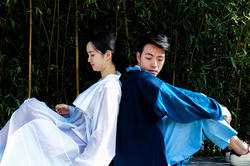RISD alums Sabina Kariat, Jessina Leonard and Masha Ryskin will conduct research in Turkey, Germany and Israel during the 2021/22 academic year.
Record Number of RISD Fulbrights

A remarkable seven new and recent RISD alums are fanning out across Europe and Asia in the coming months as part of the 2022–23 Fulbright US Student Program. As RISD’s Fulbright Program Advisor Lisa Cramer points out, that ties the college’s own record for grant year 2010–11 (the only other time that seven student Fulbrights were awarded to one school in the "specialized institution" category).
“I see Fulbright grants develop from a spark of an idea into a thoughtful, finely tuned proposal for an experience in which surprising challenges are faced and new perspectives are gained.”
“We in RISD Careers are thrilled to help send seven artists and designers out into the world to ask questions, learn, engage, collaborate, innovate and make this planet a better place for everyone,” says Cramer. “I see Fulbright grants develop from a spark of an idea into a thoughtful, finely tuned proposal for an experience in which surprising challenges are faced and new perspectives are gained.”


Philippines native Bhen Alan MFA 22 PT will return to his homeland “to study the rich banig weaving tradition of the Philippines from all angles,” he says—“the technique, rituals, histories and stories that are integral to Filipino artistry and hold memories of the weaver’s life and the larger community.” With the support of Palawan State University and Silliman University, Alan will investigate the process, spirituality and materiality of Indigenous Molbog weavers in southern Palawan and local tribes in Dumaguete City, Negros Oriental.
“My goal is to... create sculptural works that combine traditional knots with images that represent contemporary Taiwanese values, such as sustainability and environmentalism.”
Across the Bashi Channel in Taiwan, former Apple materials and product designer Jessy Lu 16 TX will focus on the traditional friendship knot, which represents community connection and heralds good fortune. “While decorative knotting originated in China, Taiwan is central to the revival of this ancient folk art,” Lu says. “My goal is to explore the decorative knot in collaboration with the National Taiwan Craft Research and Development Institute and then create sculptural works that combine traditional knots with images and materials that represent contemporary Taiwanese values, such as sustainability and environmentalism.”

Three thousand miles west in Mumbai, India, new grad Abiola Makinde 22 ID will research design solutions with doctors at the Indian Institute of Technology to help children suffering from sickle cell disease. “By combining innovation, empathy, communication and a user-centered design approach, I hope to identify patients’ challenge points and positively affect the overall experience of patients and caregivers,” she explains.
“I hope to identify patients’ challenge points and positively affect the overall experience of patients and caregivers.”

The other four RISD Fulbrights will travel to Europe: Brooklyn-based artist Gabriel Bielawski 17 FAV to Poland; architect/experimental roboticist/artist Mandy Lee MFA 22 GL to the Czech Republic; artist and illustrator Maegan Murphy 20 IL to Istanbul, Turkey; and multidisciplinary designer Irina V. Wang MID 20 to Finland.

Like Alan, Bielawski is pursuing a project that reflects on his background and family history. He’ll study the controversial folk craft of na szczescie to zyd (lucky Jews), small, carved wooden figures that have become popular in Poland and are intended to bring good luck. His uncle, a Jew who hid in Poland’s Wegrow region during World War II, created wooden carvings, and Bielawski hopes to discover how the parallel but intrinsically different craft traditions among Jews and Poles served as a kind of cultural exchange.
Lee is also considering Eastern European history via her project in the Czech Republic, where she’ll investigate how glass-making traditions have evolved since the late 1940s. “First, I will research the conceptual movements (why) and methods of production (how) that arose during and after Communism,” Lee says, “and then I will integrate the research within my studio practice to develop a new body of work I’ll exhibit at the Univerzita Tomáše Bati (UTB) in Zlín.”

Some 1,500 miles away in Istanbul, Murphy will study the patterns that have evolved over centuries and are still used in local tiles and carpets. She’ll work with faculty members at Mimar Sinan Fine Arts University, contemporary artists, and curators at the Sadberk Hanim Museum.


“I will assist the museum with the development of their exhibitions for the 2022–23 year and contribute to their weekend courses engaging young children in their cultural heritage and art,” says Murphy. “I hope to connect the abstract languages of traditional crafts with… contemporary voices that highlight and address the complexities of identity in our increasingly global community.”
“I hope to connect the abstract languages of traditional crafts with… contemporary voices that highlight and address the complexities of identity in our increasingly global community.”
And finally, Wang will study the complex dynamics between Sámi communities in northern Finland and the wide range of climate change mitigation measures—such as conservation, rewilding and geoengineering—in use on the Arctic frontlines by university scientists and public institutions. “It’s critical to understand the contradictions between a flattened or romanticized Western view of Indigenous knowledge and the lived realities of Sámi people,” she says. She’ll also develop a set of speculative artifacts to tell the complex stories of systems transition in Finnish Lapland with the goal of inspiring more conscientious policymaking at regional and national levels.
—Simone Solondz
Follow the fellows’ Fulbright journeys online at risdfulbright.com.
July 28, 2022


